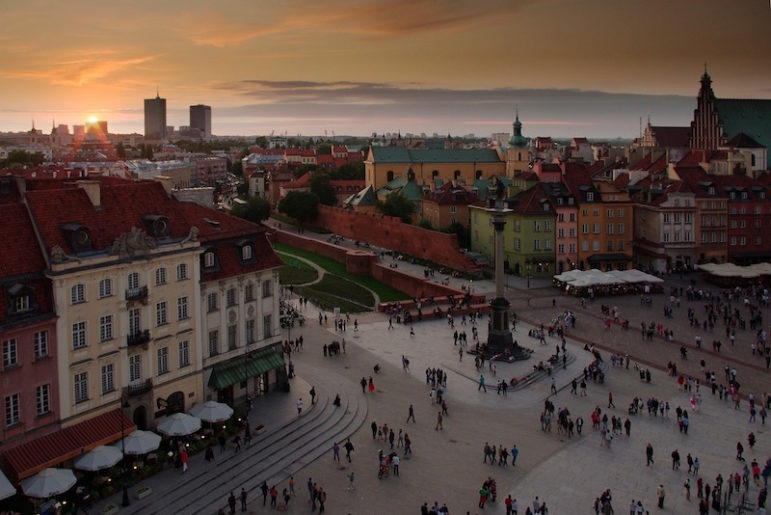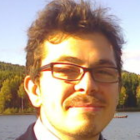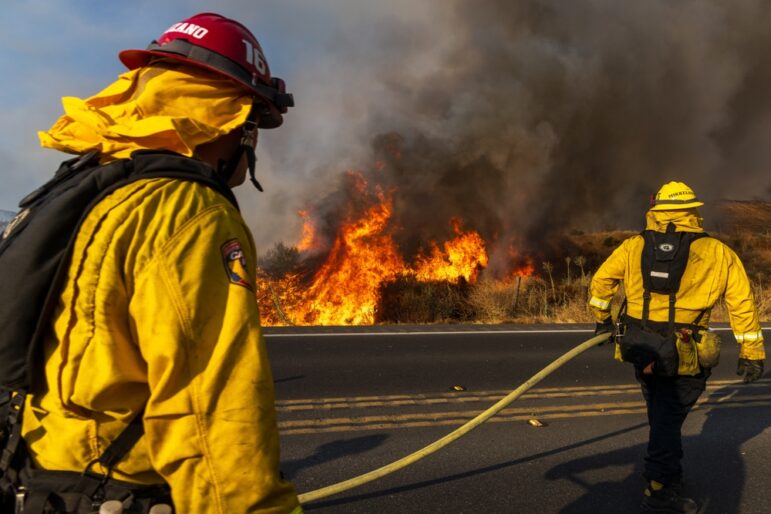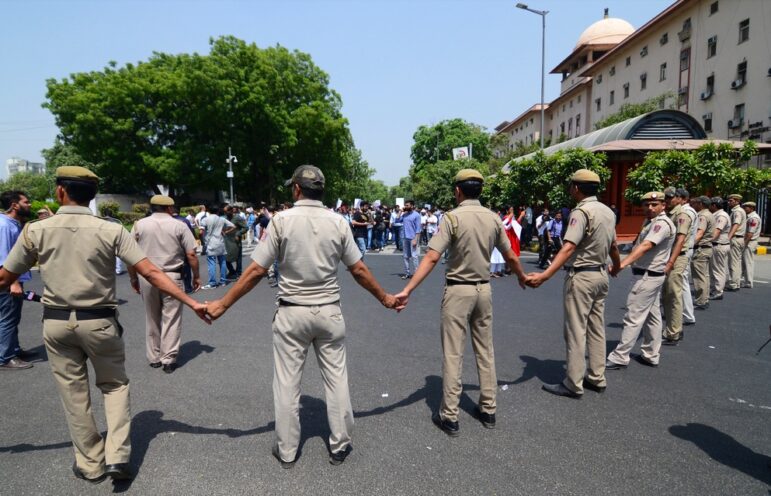

Warsaw, Poland. Photo: Pixabay
Investigative Journalism in the V4: How Polish, Hungarian, Slovak and Czech Reporters Work Together
Tucked away in a leafy residential street of Warsaw stands an unassuming detached house. The only name displayed on its intercom is that of a local IT firm.
However, it’s here, in a spacious mezzanine floor room, that some of the best reporters in Poland have launched two important projects focusing on investigative journalism: Fundacja Reporterów and Vsquare. The former was established in 2010 by a group of four Polish reporters: Paweł Reszka, Wojciech Cieśla, Michał Majewski and Roman Daszczyński.

The Visegrad Group of EU members in Central Europe: Czech Republic, Hungary, Poland and Slovakia. Credit: Wikipedia.
They all came from the busy newsrooms, Poland’s leading dailies and weeklies such as Gazeta Wyborcza, Rzeczpospolita and Newsweek Polska, and have valued in-depth investigative journalism. Since then, Fundacja Reporterów has been providing training to investigative journalists and helping them to get grants.
Vsquare started in 2017 and is a platform publishing long, well-researched investigative journalism stories in English on Central Eastern Europe focusing on the Visegrad Four, which includes Poland, Hungary, the Czech Republic and Slovakia. It is made by Polish, Hungarian, Czech and Slovak reporters working for some of the best independent media outlets in their countries and often cooperating together on the same stories to give them a transnational perspective.
Visegrad/Insight met Wojciech Cieśla, director and co-founder of Fundacja Reporterów, in Warsaw and spoke with him about both projects.
You created Fundacja Reporterów nine years ago. What was its original goal and main region of interest?
During our first three years, we mostly worked with journalists from the former USSR, Azerbaijan and Ukraine. We cooperated a lot with Ukrainian reporters and helped them out by establishing an annual award for the best investigative journalistic work as well as seminars and workshops thanks to grants we got from the Polish Ministry of Foreign Affairs.

Wojciech Ciesla. Photo: Samannttha / Creative Commons
Then, during the Ukrainian Revolution in 2014, we realized that the quality of journalism in that country had improved so much they didn’t need further help from our side. I’m proud of the people we worked with in that period and some of them — such as Kristina Berdinskich, Serhiy Leschenko and Dmytro Gnap — have become famous journalists today.
Then you shifted your focus from Ukraine and Eastern Europe to Poland and the Visegrad region. Why?
After 2015 we got some funding that helped us to establish a network and Vsquare.org has sprung from it. Now we cooperate with Czech journalists, joining the Czech Centre for Investigative Journalism (CCIJ) and Hungarian reporters working for independent media outlets Atlatszo and Direkt 36.
In Slovakia we used to collaborate with Nikola Bajánová from the Slovak National Radio, then we started cooperating with journalists from the portal Actuality.sk – where Slovak reporter Ján Kuciak worked before his assassination in February 2018 – and they’re very good, but also a bit overwhelmed with their daily work. Now we’re in touch with the Investigative Centre of Ján Kuciak, thanks to Pavla Holcová from the CCIJ who has been helping them out in establishing their center in Bratislava that opened in January this year.
On Vsquare, you cooperate with colleagues who are not based in Warsaw, but in Budapest, Prague and Bratislava. How do you coordinate this kind of newsroom and how does the project work?
Vsquare started publishing content about two years ago, after a couple of months spent creating the website. The idea of creating it came from Fundacja Reporterów in Poland.
We think that investigative journalism needs some special attention, and that this kind of attention is different from our everyday work. We’re neither a news agency nor an investigative watchdog controlling those who hold the power in our countries, but we try to know and tell what’s happening.
On top of this, we all report for a living for different media outlets, because with the budget we have allocated for this project we can’t offer proper salaries, even though we can pay reporters for their stories and offer some money to editors, fact-checkers and translators.
At Vsquare, we don’t feel the same pressure we experience in the media outlets we work for, but we can delve in-depth, focusing on a story for as long as it needs. And I think a good story deserves time and editors’ patience.
I’m 47 years old, but the average age in Vsquare is much lower and not everybody within the project has the same level of engagement or is able to meet their deadlines. Every day, we discuss the topics we’ve been following or are going to follow on an online platform within dedicated chat groups.
However, my own experience as an investigative reporter has taught me that you need to see people physically every once in a while and that’s why we’re going to set Vsquare meetings about four times a year: The first one took place in Slovakia this March.
Do investigative reporters hailing from the four Visegrad countries have much in common?
Of course, there are differences between Poland, Hungary, the Czech Republic and Slovakia, but I believe we should group these four countries together as they share a common pattern.
For example, in Poland, the ruling party PiS has been copy-pasting some politics coming from Hungary, such as with media laws. Hence, knowing what happens in Hungary can help in predicting what might happen in Poland.
We try to dig some common stories and publish them on Vsquare. What I learned from Vsquare is that there’s a growing knowledge on the current political and economic issues in each Visegrad country.
Before Vsquare, I didn’t know much about Hungary, the Czech Republic and Slovakia, but I’ve been delving deeper into the region over the last two years working and editing stories with colleagues from other countries and now I feel like a proper Central Eastern European journalist.
I wouldn’t expect Polish newspapers to write about what’s going on in this region, but for me it’s important, and I think our role is to make Polish, Hungarian, Czech and Slovak people more interested in what happens in each Visegrad country and abroad.
Speaking of which, what kind of stories do you research and publish on Vsquare?
One of our latest stories was on how patriotism has been militarized in Central Eastern Europe. We checked the way this works in every Visegrad country and found out how the Polish situation is different from the Hungarian one, but very similar to the Slovak one.
Also, we covered the Russian influence in the region and now we’re doing the same with the Chinese influence, which is something that is very much in the news: Just look at what’s happening with Huawei in this part of Europe and at the creation of a 5G network in Poland.
Thanks to independent media outlets such as Index.hu, Atlatszo and Direkt 36, investigative journalism is very much alive and kicking in Hungary, despite an unfriendly political environment and a growing media concentration in the hands of pro-government entrepreneurs. What’s the situation in Poland?
Today there are no Polish equivalents to those Hungarian independent media, as we still can’t compare our situation to the Hungarian one. However, we’re aware that we should be prepared for worse times.
Investigative journalism in Poland is not paid enough and what it has in common with Hungary is that it is published by independent media outlets. Apart from private broadcaster TVN that has a well-financed program running very good stories, investigative journalism in newspapers, on the internet and on TV has been disappearing in Poland.
On the one hand, the scene for investigative journalists is getting smaller and smaller, and as investigative reporters we see more people leaving the profession than new colleagues joining it. On the other hand, investigative journalism is in transition and we look at it optimistically. There are going to be more chances around for investigative reporters and for us as mentors.
Do you have any ongoing or upcoming projects to help investigative journalists in Poland?
The main problem we face is not the lack of youngsters interested in joining our profession, but the lack of space for publishing their stories. We want to create such a space for them and have been working on a platform that we aim to launch in 2020.
We still don’t know whether it will be in Polish only or both in Polish and English but we’re looking at similar experiences abroad such as the Investigative Reporting Project Italy.
Today people coming from TVN and from the portal Onet.pl work with us, but students are interested in joining us too and that’s why we want to attract them by cooperating with the University of Warsaw. Also, colleagues from traditional Polish media are looking with interest at what we’ve been doing.
What difficulties do you face to keep Fundacja Reporterów and Vsquare going?
Our key issue is the lack of financing. We joined the Organized Crime and Corruption Reporting Project, but are not funded by them. Since 2017, we’ve only had a single donor and it’s not an easy situation for us.
We avoid private wealthy donors because there is no such culture in Poland and because that might cause some issues to our independence in the future. Also, we’re not interested in taking any funds from the Open Society, because if we did that, we would easily be targeted by government-friendly media accusing us of being a part of the so-called “Soros Army.”
What we do instead is look around to get clean money by accessing international grants. We’re quite transparent on our financial reports and publish them on our website even though that is not required by the Polish law.
I’ve spent many years in big newsrooms of national dailies and weeklies, but I see the necessity to establish an independent investigative journalistic project here. Vsquare is not that big yet, but it is energy-consuming and it needs constant attention. It means additional work, but we have fun doing it.
This article first appeared in Visegrad/Insight and is reproduced here with permission.
 Lorenzo Berardi is a freelance journalist hailing from Italy and living in Poland. He covers Central Eastern Europe for Italian and international media outlets and publications. He co-founded and co-edits the Italian journalistic project Centrum Report focusing on the Visegrad region.
Lorenzo Berardi is a freelance journalist hailing from Italy and living in Poland. He covers Central Eastern Europe for Italian and international media outlets and publications. He co-founded and co-edits the Italian journalistic project Centrum Report focusing on the Visegrad region.









